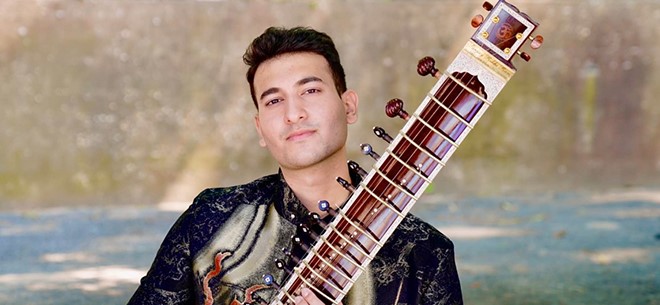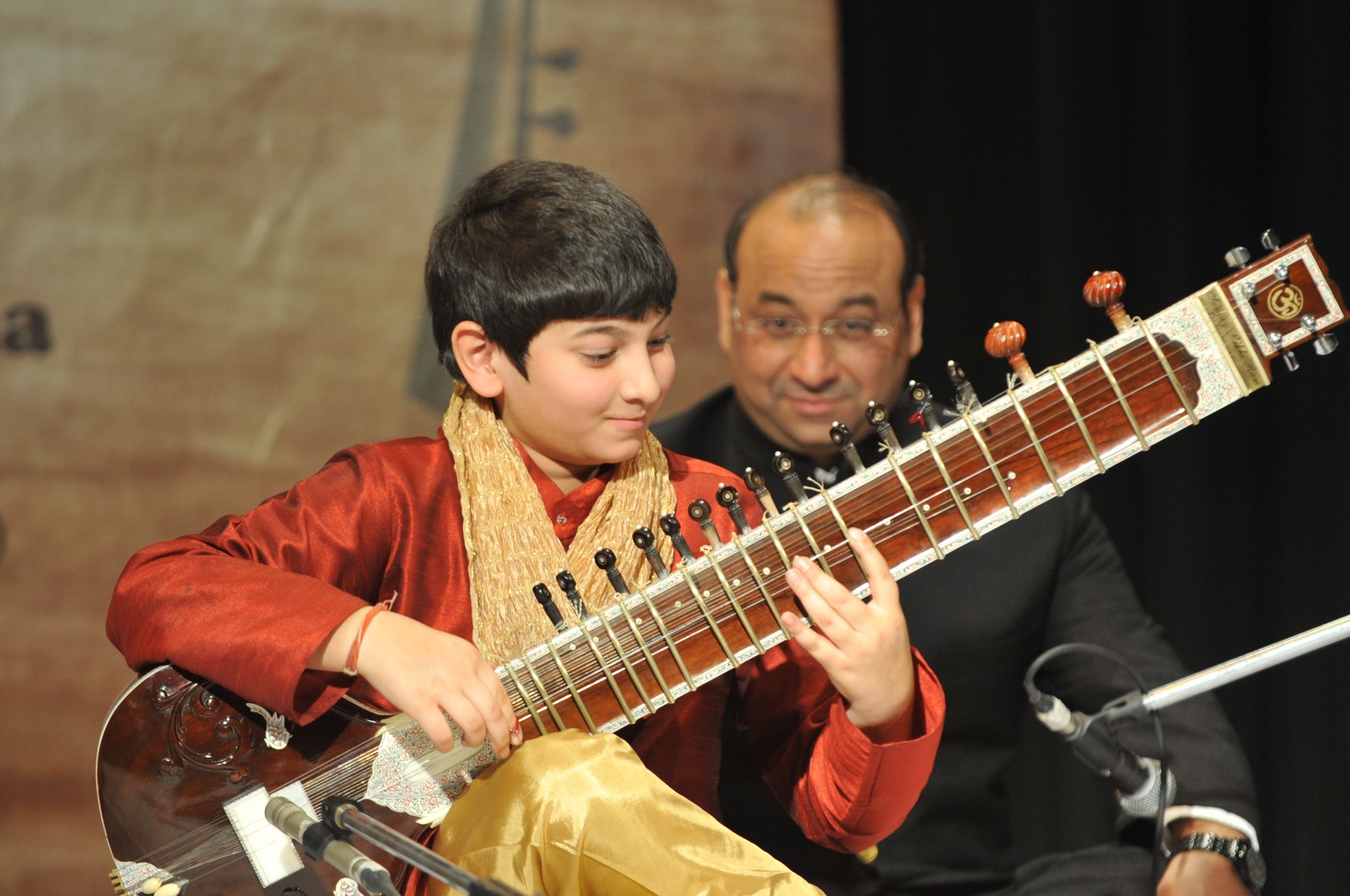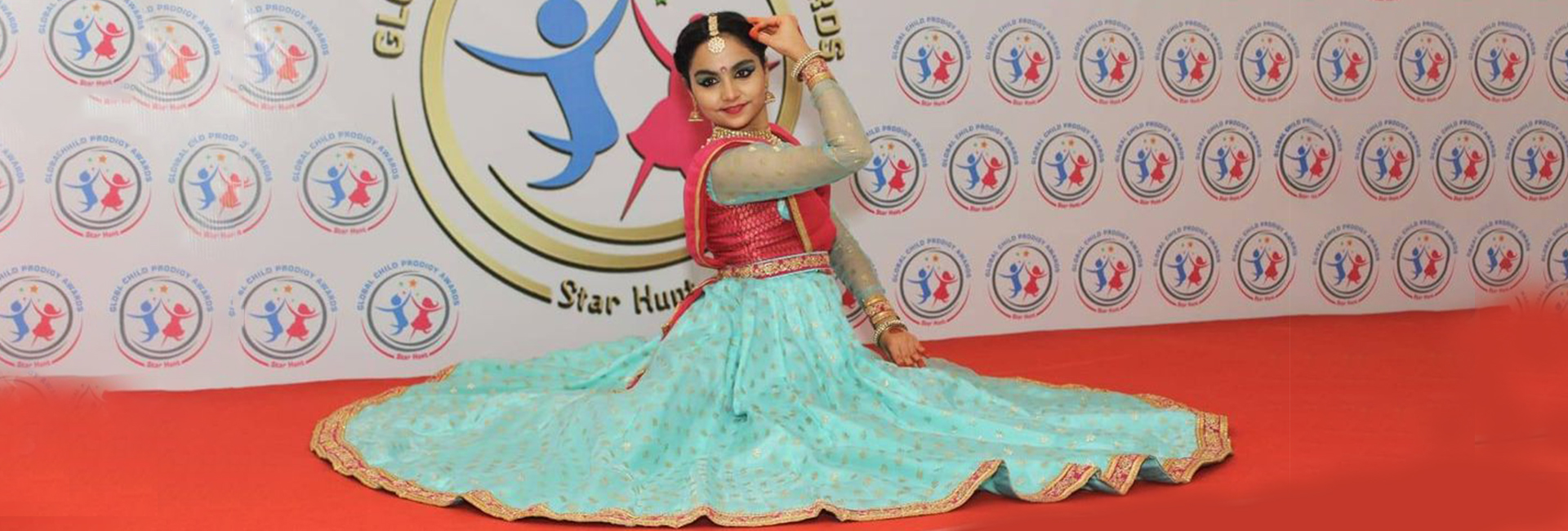Grief had debilitated him and Rishab Rikhiram Sharma locked himself in his room, turning himself away from the love of his life – his sitar. Growing up, the instrument had always been his greatest source of comfort, his “happy place,” the thing he turned to in good times and bad. When he lost his grandfather before the pandemic, his “third parent and best friend,” there was no comfort to be found. Global Indian looks at how this young prodigy, the youngest and final disciple of Pandit Ravi Shankar, pulled himself out of his abyss, picked up his sitar once more and found a way to bring peace to other people through the music that had given him so much. At 24, Rishab, the founder of Sitar for Mental Health, has performed before a live audience of 60,000 and appeared on Indian reality TV shows and channels.

Rishab Rikhiram Sharma, founder of ‘Sitar for Mental Health’
The Rikhiram legacy
Born in Delhi into a renowned family of luthiers, the Rikhirams, Rishab laughs as he recalls never being allowed to touch the sitar. His grandfather, Rikhiram, after whom the family business was named, crafted instruments for India’s top musicians, including Pandit Ravi Shankar. “My parents didn’t let me touch the sitar for the longest time. I come from a family of instrument makers, we have been doing it since 1920. When I was a child, I wanted to get my hands on the sitar but my parents said no, saying it is a sacred instrument. When someone tells you not to do something as a kid, you want to do it even more,” he said in a recent interview.
Rishab was, however, allowed to play the guitar and got quite good at it, “playing songs and barre chords and everything.” One day, a broken sitar was sent back to the house. His father, the national award-winning luthier Sanjay Sharma, fixed it up and left it on the wall to dry. Rishab looked at it quietly, gathering the courage after a couple of days to ask his father for permission to play it. Finally, his father consented. He held the sitar in his hand, it was a fretted instrument, like the guitar. “I figured out ‘sa ri ga ma‘ within minutes and started playing Bollywood songs,” he recalls. “I was 10 at the time.”
Finding a guru
His father was impressed and agreed to teach his son, becoming his first guru. In 2011, his father allowed him to perform on stage for the first time. That debut performance caught the eye of sitar legend Pt Ravi Shankar, whose own instrument had been made by Sanjay Sharma. He rang Sharma the next day, saying, “Bring Rishab to Delhi when I am there.”


Rishab with his father, Sanjay Sharma
When the maestro was in town, the family duly paid him a visit. “He surprised us by offering to make me his disciple,” Rishab said in an interview. “That was the moment I fell in love with the sitar and decided to make it my life.” He was around 12 at the time.
Being a disciple of Pandit Ravi Shankar is perhaps the greatest honour that a young musician can ask for but Rishab learned, quite quickly, that it wouldn’t be easy. His guru was a strict teacher, pushing his students as much as he could to unleash their potential. “That strictness was only during the teaching,” Rishab laughed. “The moment we left the music room, he would chat with me, about my favourite food, my girlfriends. I had a great time with him and there were moments when I got scolded, ‘Are you stupid or what?’ he would say.”
With such tutelage to guide him, Rishab’s career blossomed – in 2016, he was among the lineup at Howdy Modi in Texas, playing to an audience of 65,000 people, who sang in chorus as he played ‘Sare Jahan Se Accha’. He has been mentored by Pandit Parimal Sadaphal, one of Pandit Ravi Shankar’s seniormost disciples and by Ustad Amjad Ali Khan, Ustad Rais Khan and Pandit Arun Bharatram.
Coping with grief
In 2020, his world came crashing down. Rishab’s grandfather, the man who was always in the front row, clapping when his grandson played, passed away. All his life, the sitar had been Rishab’s ultimate therapy, “If I was angry, I would practice for hours and let the emotions flow. When I lost my grandfather, I was grieving, I stopped playing.” He stayed in his bedroom instead, barely eating or sleeping, struggling to cope.
Finally, Rishab’s friends suggested therapy. He looked for help online but this was the pandemic, everybody was struggling and there were no therapists available. By this time, the family had moved to New York and Rishab was studying music production and economics at the City University in New York. Rishab went to a psychiatrist – at the time he didn’t know the difference. The psychiatrist was patient with him and Rishab came away knowing that he couldn’t give up on his music.
Sitar for Mental Health
Looking for an outlet, he went live on social media. Clubhouse, the invite-only voice-based social networking platform that was popular at the time. Rishab opened a hosting room and went live. Three people turned up. The next day, there were six. The number grew and eventually, Rishab had around 4,000 people listening in the audience. “It was a beautiful space because I wasn’t just playing the sitar. I was talking about grief. Other people opened up too, they made music and recited poetry.”
The Clubhouse event grew into Sitar for Mental Health, which Rishab continues to sustain. The event always begins with ten minutes of breathing exercises before the show itself, leading into the Jod and Alaap he learned from his gurus. “I am no therapist. I am just using my music to heal people in all ways possible,” Rishab told NDTV.
These days, he plays a lot of bhajans, he says. He’s also working on an EP called Sitar ‘n Chill, making romantic sitar music, he chuckles. Another album, Navaras, explores the nine human emotions. A big hip-hop fan, he hopes to collaborate with Kanye West and Drake, given the chance and if he had his pick of Indian musicians, Nav and Diljit Dosanjh.
- Follow Rishab Rikhiram Sharma on Instagram and Facebook


